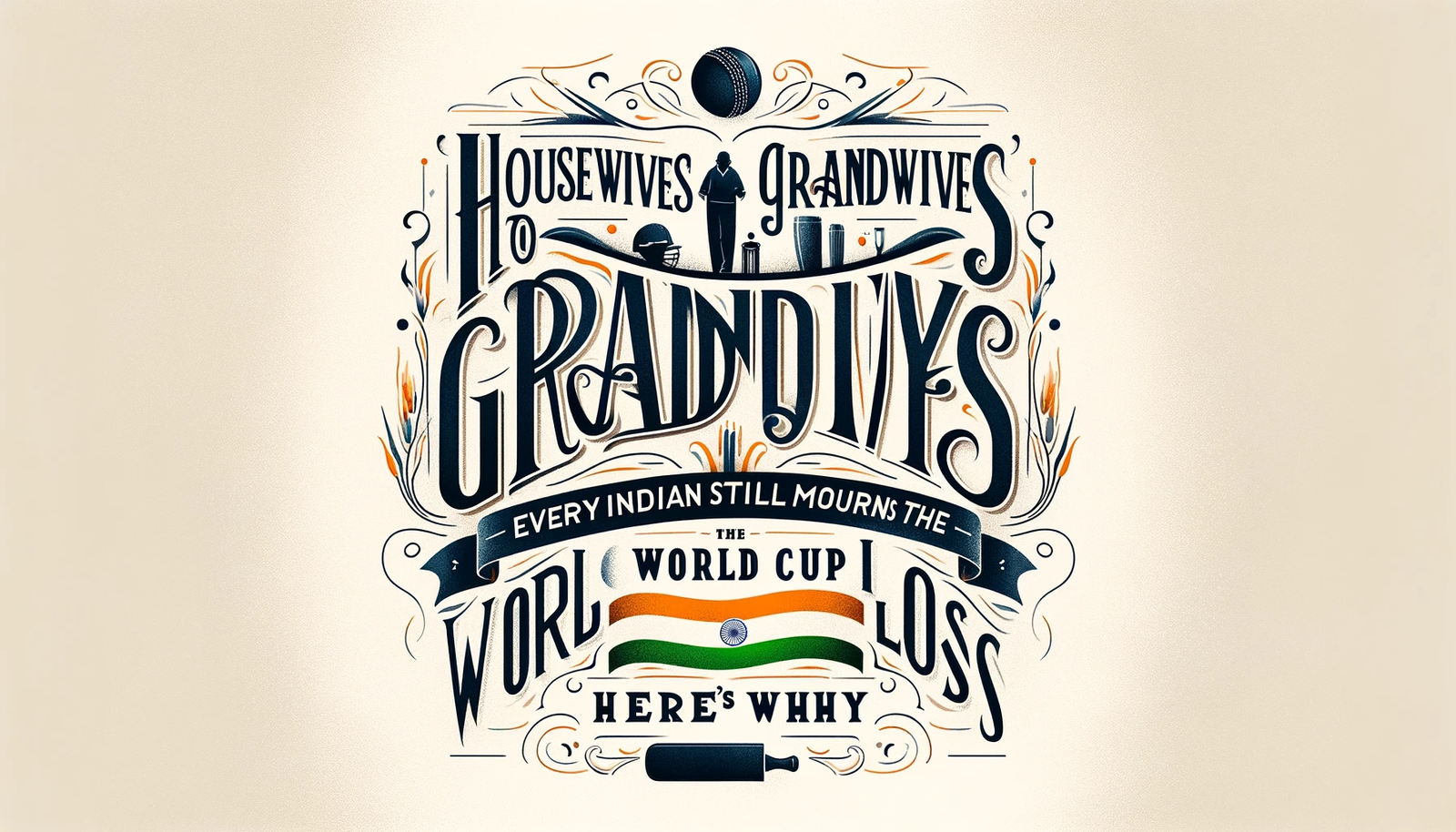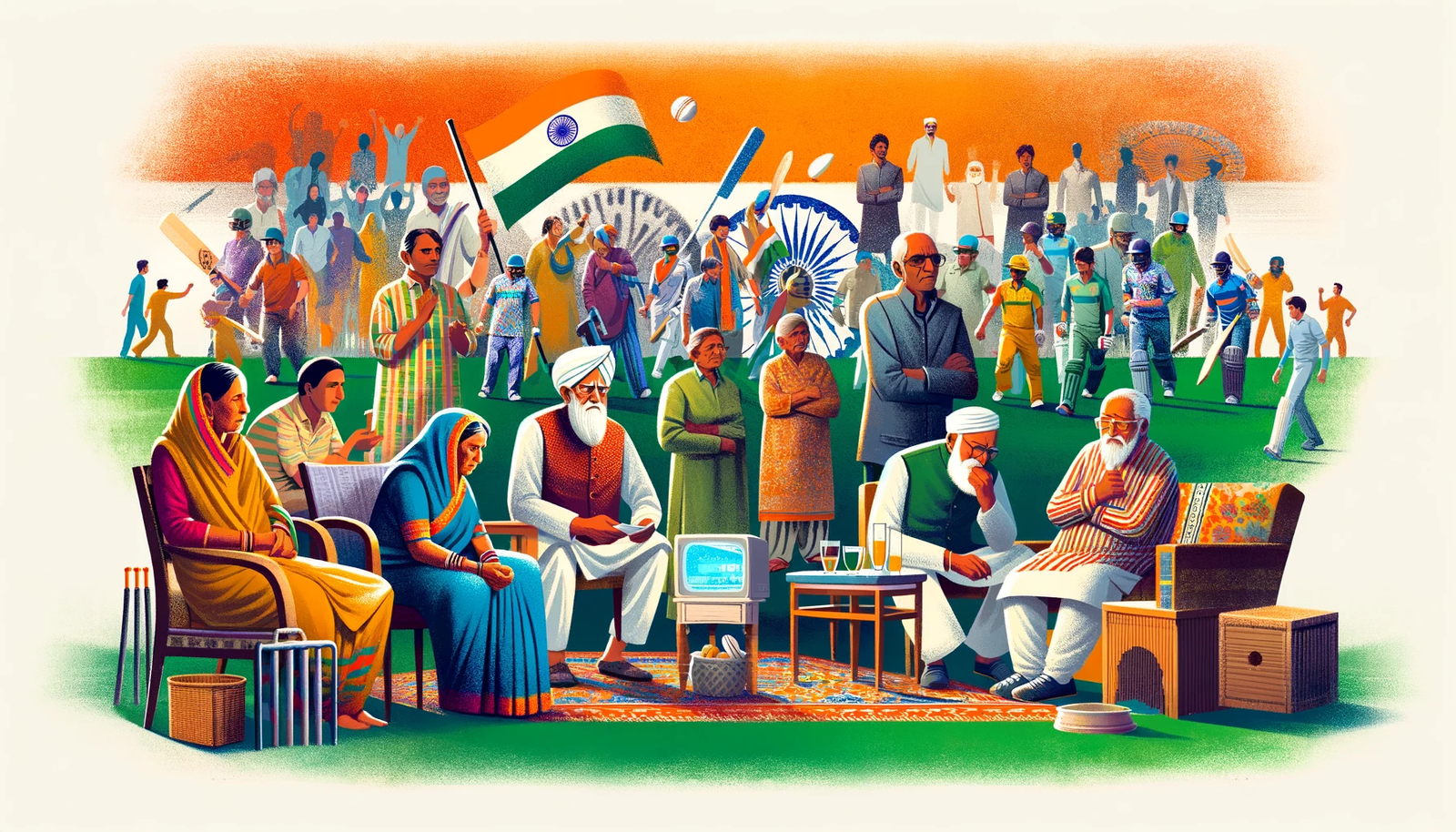From Housewives to Grandpa, every Indian still mourns the world cup loss. Here’s why

It has been a living nightmare for Indian cricket fans. It certainly must be devastating to see India losing their 3rd T20 against Australia and with so less odds to win that one. Indians are heart-broken and hopeless again as after 2 straight wins against the mighty Kangaroos, it was time to take the revenge of our world cup loss but Australians are not going to make any Indian fans forget what happened 10 days back. Let’s go back to 19 November, 2023. Australia easily, brutally, convincingly beat the undefeated-in-the-world cup Indian team, who seemed rock solid against any team including Australia whom they beat in the league matches. 1.4 billion are still unable to grasp the fact that Indians lost.
If I go to a cafe, a wedding, or a garden, I can easily find one out of three people somehow circling their talks back to the World Cup Final. I never knew the whole country was a cricket fan, but this seemed something different. It’s so obvious that both teams can’t win, not in cricket, not in football, not in rugby, or in any sport, then what the hell happened on November 19 that people are still not forgetting it and just constantly talking about it like it’s a personal loss to them?
Housewives in India are most known for their ‘No Interest in Worldly Affairs’ as for them, children, husband, and family are everything. It’s their whole world.
I have met many housewives telling me that they watched the whole final, one of the very few or rare cricket matches in their entire lives. It’s not common at all. And while we are talking about the mourning, we should not ignore the hardcore fans who painted their cars blue, who prayed, fasted on the day of the final, and whatnot. What about them? What has happened to them? Well, on asking a few of the many billion fans, they said, ‘We won’t watch cricket. I quit. I will retire from watching.’ It was one of the most common and expected answers from everyone. But why can’t a billion people, who have their own struggles, digest the fact that India’s hope was cruelly tarnished by the Kangaroos?
There can be many reasons behind that but to start with – India is a country of emotions, India is a country of different cultures, a land where millions of different Gods can be seen, a map where different languages are spoken, many festivals celebrated it’s like every month there are a couple of holidays, still they are ONE. Indians are emotional, because their culture is ‘people’ family’. Unlike the western culture, 90% or more people would live in joint family as in everyone lives together, parents, children, grandchildren and there is no retirement age when the government takes care of the aged parents, they do it wholeheartedly, they do it out of the inbuilt ‘Sanskar’ (a Hindi word meaning ‘Values’) and they are not shy of it.
Indian people, fans and non-fans, want an answer from their billion prayers and million gods why a deserving team with their home crowd roar and advantage can lose against a team whom they already defeated in the league match. They want an answer from their own lives – the mostly-middle class filled country which is tagged as ‘Developing’. They want an answer of ‘Whether they will be successful and happy in their own lives if they work hard enough?’ Will luck or destiny or the universe help them? If it’s true that there are prayers, there are gods, then how can India lose, it’s like the defeat directly questioned their inner ethics and virtues. They have started questioning themselves about their own struggles to livelihood.
After the cricket loss, many people in India are now doubting their own hopes and efforts. They’re starting to wonder if hard work always leads to success or if luck plays a bigger part. This defeat is making them think more about how unpredictable life can be. It’s a moment where they’re questioning what hope and success really mean, and how much control they actually have over their own lives.
The World Cup symbolized a beacon of hope for them – a potential victory on behalf of an entire nation affirming India’s ascent, progressing more rapidly than ever post-British rule, after numerous conflicts with China and Pakistan, after evolving brick by brick. India is steadily, albeit slowly, accelerating its pace. It’s decidedly not the apocalypse, but in a country where cricket is revered by billions and hockey, ironically the national sport, is scarcely followed by thousands. Regrettably, few could name the 11 players of the international hockey team.
Coming back to the 3rd T20 match, Glenn Maxwell once again demonstrated the quintessential Australian spirit of resilience and grit in the face of adversity during the 3rd T20 against India. Defying the odds, Maxwell played a crucial role in steering his team towards a potential 5-0 clean sweep, a feat that, while not fully realized, highlighted the fierce competitiveness and skill inherent in Australian cricket. His performance was a testament to the idea that in the 21st century, hard work, talent, and persistence are often the key determinants of success, perhaps even more so than faith and miracles. Maxwell’s display of prowess on the cricket field served as a reminder that, in the high-stakes world of international sports, it’s these qualities that often turn the tide, crafting thrilling narratives and unexpected outcomes.
Will this cricket defeat mark a turning point for Indians, leading to a profound shift in their collective consciousness? Could this event prompt a reevaluation of values and aspirations, transcending beyond the realm of sports? Will it ignite a deeper introspection about the nature of success and failure, influencing future endeavors? Or will this moment gradually fade, becoming a poignant but distant memory in the vast tapestry of India’s rich and diverse history?
Every ball bowled is dissected with an expertise that would rival the commentators. In the remote villages, where modernity is still a distant echo, cricket resonates through old, crackling radios.
This shift reflects a broader change in societal attitudes, marking a significant step towards gender equality in sports. They thrive and evolve, breaking boundaries and defying stereotypes.
Cricket was the centerpiece; the World Cup was the focal point. And we forfeited it. Perhaps because it was so ‘assumed’ that we would prevail, the Indian team underestimated Australia. Or perhaps the Indian team was encumbered with immense pressure – ‘1.4 billion people’s aspiration’ pressure – knowing Australia perceived they had nothing to lose (already possessing five World Cup titles). From toddlers just beginning to articulate to grandfathers scarcely speaking to housewives of male-dominated country who rarely gets a chance to speak or stand for their own existence, all chanted ‘Jitega Bhai, Jitega, India Jitega’ (We will win, brother, obviously, we will win, India, India). 10 days after the finals, we still mourn. But ‘Australia won’, ‘Australia keeps winning it’.





